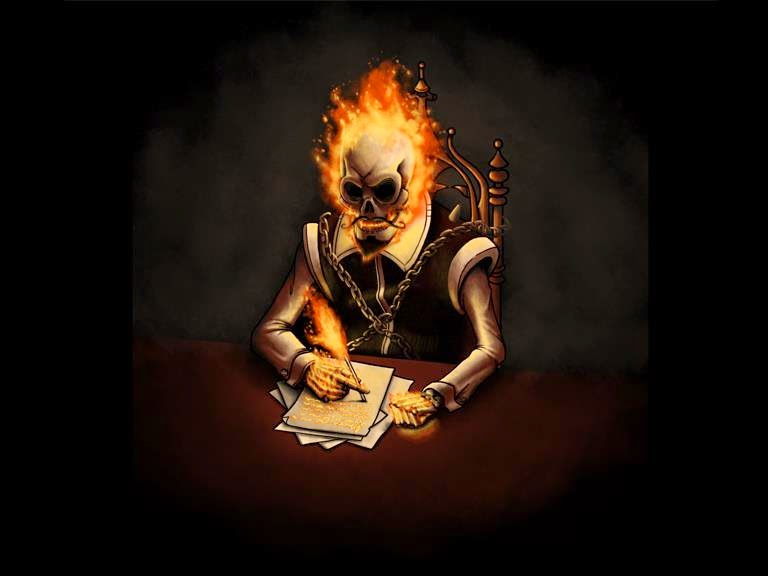Hope you had a fantastic New Year, everyone. Welcome to 2017. Or, as history will probably call it, America’s make-or-break year.
 As I often do at the start of each year, I wanted to blab on for a minute or three about what I hope to accomplish with this little collection of rants and ravings. And I think one of the best ways to accomplish that is to start off by telling a quick story…
As I often do at the start of each year, I wanted to blab on for a minute or three about what I hope to accomplish with this little collection of rants and ravings. And I think one of the best ways to accomplish that is to start off by telling a quick story… Another friend of mine—a very accomplished professional writer—talks about some advice he got once from Richard Matheson. To paraphrase, writing is an art. Publishingis the business of selling as many copies of that art as possible. If I want to be a successful writer, I need to understand that difference.
What does that have to do with my rants?
This page isn’t about “when you’re done.” I’m always coming across pages and groups where people want to know what to do with their finished manuscript. How do I get an agent? How do I promote myself? How do I get a publisher? Should I self-publish? Should I be networking more? How do I get blurbs?
None of that here. That’s all publishing stuff.
Not to sound harsh, but this page also isn’t for inspirational ideas, mindless encouragement, or a joyous celebration of art. I’m not really big on the we-can-all-succeed mindset (I used to say “special snowflake,” but that’s become a stupider, crueler term lately, so I don’t feel very comfortable with it anymore). I’m also not a fan of those folks who see writing as some bohemian form of expression where there are no wrong answers or directions. If that’s the kind of “advice” you’re looking for… wow, this is so not the place you want to be.
And, I also don’t use this page for self-promotion. I may mention stuff that’s new or noteworthy, but that’s about it. No sales or contests or interviews (well, not with me, anyway). There’s some links on the side, yeah, but those are almost more for credentials purposes than sales.
And, I also don’t use this page for self-promotion. I may mention stuff that’s new or noteworthy, but that’s about it. No sales or contests or interviews (well, not with me, anyway). There’s some links on the side, yeah, but those are almost more for credentials purposes than sales.
(Although if you want to buy something, I’d never object…)
So, with all that out of the way… what are all these little rants for?
 Well, it struck me about ten years ago that there weren’t many places online to find actual help with writing. Not useful help, anyway. Yeah, all that “when you’re done” stuff I mentioned is important, but the writing is the first big step. Nothing else matters until that step is done. If I don’t have a decent piece of art, there’s nothing to do on the publishing half of the equation. It doesn’t matter how much work I put into self-promotion.
Well, it struck me about ten years ago that there weren’t many places online to find actual help with writing. Not useful help, anyway. Yeah, all that “when you’re done” stuff I mentioned is important, but the writing is the first big step. Nothing else matters until that step is done. If I don’t have a decent piece of art, there’s nothing to do on the publishing half of the equation. It doesn’t matter how much work I put into self-promotion. I look around and I saw—and still see—a lot of folks making mistakes with their writing. Sometimes it’s from inexperience. Sometimes it’s wishful thinking. Sometimes it’s from following bad advice. And a few times…
Okay, sometimes I have no clue where some people are getting their information from.
This is the time when we all make a lot of resolutions. We’re going to quit smoking, drink less, eat better, exercise more, travel more… and maybe write more. Maybe finally get that manuscript finished and out to some publishers.
This is the time when we all make a lot of resolutions. We’re going to quit smoking, drink less, eat better, exercise more, travel more… and maybe write more. Maybe finally get that manuscript finished and out to some publishers.
Now, sadly, we all know the truth behind a lot of these resolutions. Most people don’t follow through on them. In fact, a lot of gyms and weight loss programs make a ton of money off people who sign up for a one year membership in January and then more or less give up in… February.
I’ve already seen a ton of folks making promises to themselves. To finish a screenplay or a book. Maybe two books. That’s mine. To finally get two books done in one year.
But why? Do I just want to write a screenplay because I’ve always wanted to try it? Or am I hoping this could lead to a career in the film industry? Am I looking to write a novel just for myself, or am I maybe looking to…well, make some money off of it? And if so, am I looking at this as a nice hobby that will pay for some LEGO models, or is this something I’m hoping will be a career? Like a paying-all-the-bills career?
 As I talked about earlier, when I first started this page a good chunk of the actual writing advice I could find was kind of… questionable. Always follow this structure. Always write at least 1000 words a day. Don’t worry about spelling or editing. Never use common words. Never use said. Name every character. It all just seemed to be either something people were pulling out of the air or they were repeating something that had gone through twenty rounds of the telephone game.
As I talked about earlier, when I first started this page a good chunk of the actual writing advice I could find was kind of… questionable. Always follow this structure. Always write at least 1000 words a day. Don’t worry about spelling or editing. Never use common words. Never use said. Name every character. It all just seemed to be either something people were pulling out of the air or they were repeating something that had gone through twenty rounds of the telephone game. So what I’ve been trying to do here is to fill a gap. To offer some useful help for people who’d like to improve their writing and move it toward something they could actually sell to a much larger audience and maybe not just… well, a hundred people they know between Facebook and Twitter.
This means there’ll be some harsh facts now and then. Yeah, facts, not opinions. Also some very firm rules. Some people will argue with these (some people always do) because some of those facts and rules are going to go against the way they’ve chosen to see things in the writing-publishing world. Others will be upset because some of the things I say might indicate they’re not quite as far along their career path as they thought. Or maybe they’re not on it at all.
I apologize in advance if this ends up being you. It’s nothing personal—it’s just the facts as I see them after almost (gasp) thirty-seven years of trying to do this professionally. If it makes you feel better, there are very, very few screw-ups you can make that I didn’t beat you to ages ago. And I learned from them and want to help you get past them.
 I’ll also offer up some much gentler tips and advice. Some of these suggestions will work for you. Some won’t. Part of my job as a professional writer is to figure out what does and doesn’t work for me. I’ve spent years doing it. If you want to be a professional, it’s part of your job, too.
I’ll also offer up some much gentler tips and advice. Some of these suggestions will work for you. Some won’t. Part of my job as a professional writer is to figure out what does and doesn’t work for me. I’ve spent years doing it. If you want to be a professional, it’s part of your job, too. And if writing’s just something you like to dabble with on weeknights because you enjoy it… cool. Nothing wrong with that. Maybe you’ll find some stuff here that makes it even more fun for you. Or maybe you’ll just show up to laugh at those of us in the publishing rat race. That’s cool, too.
So…that’s the basic idea behind this page. There may be two or three deviations over the course of a year, but mostly… that’s it. And, hey, if there’s something specific you’d like to see me blab on about, please feel free to ask. I’m always open to suggestions, and I try to get to them within three or four weeks (depending on how many things I’ve already got planned out).
Oh, and if you’re in Southern California, this weekend is both the Los Angeles and San Diego Writers Coffeehouses. San Diego is at Mysterious Galaxy and hosted by the amazing Jonathan Maberry. Los Angeles is at Dark Delicacies and hosted by the not as amazing… well, me. Both of them are noon to three, open to absolutely anyone of any skill level, and they’re completely free. No sign ups, no lists, nothing. Just show up and join in.
Next time… I’d like to talk to you about that little village near Castle Frankenstein.
Until then, go write.









